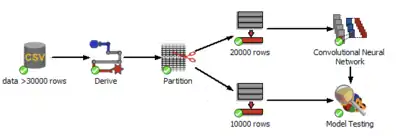PolyAnalyst
PolyAnalyst is a data science software platform developed by Megaputer Intelligence that provides an environment for text mining, data mining, machine learning, and predictive analytics. It is used by Megaputer to build tools with applications to health care, business management, insurance, and other industries. PolyAnalyst has also been used for COVID-19 forecasting.
| Developer(s) | Megaputer Intelligence |
|---|---|
| Stable release | 6.5
|
| Type | Data science, machine learning, predictive analytics |
Overview

PolyAnalyst's graphical user interface contains various nodes that can be linked into a flowchart to perform an analysis. The software provides nodes for data import, data preparation, data visualization, data analysis, and data export.[1][2] After an analysis is complete, the result may be published to a web report.[3]
PolyAnalyst supports text analytics through nodes that rely on machine learning algorithms and a proprietary programming language called PDL (Pattern Definition Language).[4] PolyAnalyst's text analytics features include nodes for text clustering, sentiment analysis, extraction of facts, keywords, and entities, and the creation of taxonomies and ontologies. Polyanalyst also contains nodes for the analysis of structured data and to execute code in Python and R.[5][6] As of 2020, the software supports text analysis in 16 languages.[7]
PolyAnalyst is typically used by Megaputer to build custom tools for businesses. It uses a client–server model and is licensed under a software as a service model.[3]
Applications
Insurance
PolyAnalyst was used to build a subrogation prediction tool which can assist in identifying subrogatable insurance claims. The tool determines the probability that a claim is subrogatable, and if so, the amount that is expected to be recovered.[8] PolyAnalyst is also used to detect insurance fraud.[9]
Business Management
PolyAnalyst is used in business management to analyze written customer feedback including product review data, warranty claims, and customer comments.[10][11][12] In one case, PolyAnalyst was used to build a tool to evaluate a company's conversations with customers by rating messages for factors such as professionalism, empathy, and correctness of response. The company reported to Forrester Research that the tool saved them $11.8 million annually.[13]
Health care
PolyAnalyst is used by pharmaceutical companies to assist in pharmacovigilance. The software was used to design a tool that matches descriptions of adverse events to their proper MedDRA codes, determines if side-effects are serious or non-serious, and to set up cases for ongoing monitoring if needed.[14] PolyAnalyst has also been applied to discover new uses for existing drugs by text mining ClinicalTrials.gov[15] and to forecast the spread of the COVID-19 virus in the United States and Russia.[16][17]
Academic
PolyAnalyst is run on the SKIF Cyberia Supercomputer at Tomsk State University where researchers have used it to manage university endowment funds, to assess the university's social media image, and to create educational modules for the school of applied data analysis.[18] PolyAnalyst has also been used by researchers at Vyatka State University to locate victims of spousal abuse through social media analysis.[19]
References
- Apicella, Mario (July 3, 2000). "PolyAnalyst 4.1 digs through data for gold". Info World.
- Zhang, Qingyu; Segall, Richard S. (2008-12-01). "Web mining: a survey of current research, techniques, and software". International Journal of Information Technology & Decision Making. 07 (4): 683–720. doi:10.1142/S0219622008003150. ISSN 0219-6220.
- Halper, Fern (2011). "Predictive Analytics: The Hurwitz Victory Index Report" (PDF). Retrieved 28 September 2020.
- Bourlai, Elli (2020-02-12). "Combining the Best of Both Worlds: Machine Learning & Rule-Based Approach". Megaputer Intelligence. Retrieved 2020-10-03.
- Zhang, Qingyu; Segall, Richard S. (2010-01-01). "Review of data, text and web mining software". Kybernetes. 39 (4): 625–655. doi:10.1108/03684921011036835. ISSN 0368-492X.
- Zhang, Qingyu; Segall, Richard S. (2010), Maimon, Oded; Rokach, Lior (eds.), "Commercial Data Mining Software", Data Mining and Knowledge Discovery Handbook, Boston, MA: Springer US, pp. 1245–1268, Bibcode:2010dmak.book.1245Z, doi:10.1007/978-0-387-09823-4_65, ISBN 978-0-387-09823-4, retrieved 2020-10-03
- "PolyAnalyst for Text Software". Megaputer Intelligence. Retrieved 2020-09-28.
- "Megaputer Intelligence". big-data.insuranceciooutlook.com. Retrieved 2020-09-21.
- Wang, John; Yang, James G. S. "Data Mining Techniques for Auditing Attest Function and Fraud Detection". CiteSeerX 10.1.1.453.5506. Retrieved 21 September 2020. Cite journal requires
|journal=(help) - "Market Guide for Text Analytics". 31 August 2020.
- Sharma, Arvind K. "Web Mining Techniques to Improve Hotel Management Services". CiteSeerX 10.1.1.415.9763. Retrieved 22 September 2020. Cite journal requires
|journal=(help) - "Web Mining of Hotel Customer Survey Data". Citeseerx.ist.psu.edu. CiteSeerX 10.1.1.455.7659. Retrieved 27 September 2020.
- Evelson, Boris (November 10, 2015). "Vendor Landscape: Big Data Text Analytics". Forrester.
- "Life sciences: Increasing speed-to-insight in pharma". www.kmworld.com. Retrieved 2020-09-22.
- Su, Eric Wen; Sanger, Todd M. (2017-03-23). "Systematic drug repositioning through mining adverse event data in ClinicalTrials.gov". PeerJ. 5: e3154. doi:10.7717/peerj.3154. ISSN 2167-8359. PMC 5366063. PMID 28348935.
- Codingest (2020-04-29). "COVID-19: Megaputer provides interactive geo-map to forecast peak of active cases in U.S." thegeospatial. Retrieved 2020-09-30.
- "В России представили модели пика заболеваемости COVID-19 в регионах". РБК (in Russian). Retrieved 2020-09-24.
- редакция, Любимая. "В ТГУ открылся Центр коллективного пользования платформой для аналитики big data". Томский Обзор (in Russian). Retrieved 25 January 2021.
- Адрес: 119234, Учредитель: Некоммерческое партнерство «Международное партнерство распространения научных знаний»; Москва, г; горы, Ленинские; адрес: 119234, офис 138 Почтовый; Москва, г; Университетская, пл; Тел./Факс: +7939-42-66, а/я №71; до 18-00, +7939-45-63 Время работы: с 10-00 (24 January 2021). "Искусственный интеллект выяснил, куда чаще обращаются за помощью жертвы семейного насилия в России". «Научная Россия» — наука в деталях! (in Russian). Retrieved 25 January 2021.